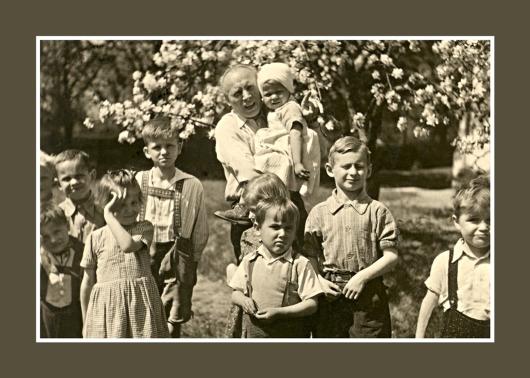
Exhibition „Přemysl Pitter: Righteous Among the Nations“
23.06.2015 / 15:23 | Aktualizováno: 26.06.2015 / 16:59
On the occasion of 120th anniversary of birth of Czech educator and humanist Přemysl Pitter there will be an exhibition in the Gallery on the Fence of the Czech Embassy between 22 June and 31 August 2015. The exhibition shows vintage as well as contemporary photographs documenting Pitter´s life, work and stories of Jewish children whom he saved during and after WWII. He and his collegue Olga Fierzova received tittles of Righteous Among the Nations Yad Vashem and trees with their names were plated in the Avenue of the Righteous in the Yad Vashem Memorial in Jerusalem. The exhibition was prepared in cooperation of the Czech Embasssy, Czech Centre with the National Pedagogical Museum and Library of J. A. Comenius.
Czech humanist Přemysl Pitter (June 21, 1895 – February 15, 1976) was a pedagogue, educator and promoter of peace, who after the horrifying experiences of WWI dedicated his life to helping others. In the 1920s and 1930s, he was active in the working-class suburbs of Prague, where he built – with the help of his friends – the so called Milíč’s House, a facility for out-of-school education of children. Except for his pedagogical activities, Pitter was involved in the peace movement and devoted himself to publishing.
During WWII he assisted Jewish families, and as the War ended he took upon himself to care for Jewish children returning from Nazi concentration camps. This operation, known as “The Castles”, was soon extended also to German children from Bohemian internment camps. “The Castles” undoubtedly belongs among the most morally valuable of Pitter’s achievements. After the world conflict ended, in full accordance with his lifetime attitude, Pitter was ready to provide concrete help to those most vulnerable – to children, irrespective of their nationality. In 1945–1947 he managed, with only a handful of colleagues, to open sanatoria in several castles in the surroundings of Prague. Children were provided with medical care, good food, and most of all, loving treatment. As they recovered, they made up for education denied to them during WWII. Along with caring for the “Castle” children, search began for children who were lost or disappeared during war time. The first group of Jewish children came to “the Castles” from Theresienstadt on May 22, 1945. Destinies of 850 children, helped by P. Pitter and his colleagues, were various. Jewish children mostly headed to Palestine, the present-day State of Israel. They grew up and began to lead their own lives. Many of them, however, maintain contacts to this day and will never forget the Czech Republic.
After February 1948, Pitter became more and more inconvenient to the communist regime and in 1951, he was forced to emigrate. In exile he continued with his selfless activities for others; however the focus of these endeavors changed as he now helped refugees from the Communist countries in particular. For ten years he worked in the refugee camp Valka in Bavaria in Germany. In 1962, Přemysl Pitter and his closest associate, the Swiss national Olga Fierzová, moved to Switzerland, where they actively participated in the community life of emigrants. P. Pitter passed away in 1976, O. Fierzová continued working for others till her death in 1990. Pitter’s achievements were acknowledged already during his lifetime: for his efforts to rescue Jewish children during the Nazi occupation, he was awarded the Medal of Righteous Among the Nations by the State of Israel and planted his tree in the Avenue of the Righteous at the Yad Vashem Memorial in Jerusalem. In 1973, he was honored by the Grand Cross 1st Class of the Order of Merit of the Federal Republic of Germany. On the occasion of his 80th birthday, he received an honorary doctorate in theology from the University of Zurich. In 1991, Czech President Václav Havel awarded Přemysl Pitter the Order of T. G. Masaryk, in memoriam, class III.
Since 1991, the National Pedagogical Museum and the Library of J. A. Comenius care for the Archives of P. Pitter and his close associate O. Fierzová, safeguarding documents on their life and work, as well as on other outstanding people who supported Pitter in his humanitarian activities. The archive also holds a treasure trove of archival materials about the children rescued by P. Pitter, some of whom are still alive and remember.
Authors of Exhibition: Markéta Pánková, Lenka Lajsková, Pavlína Schultz











